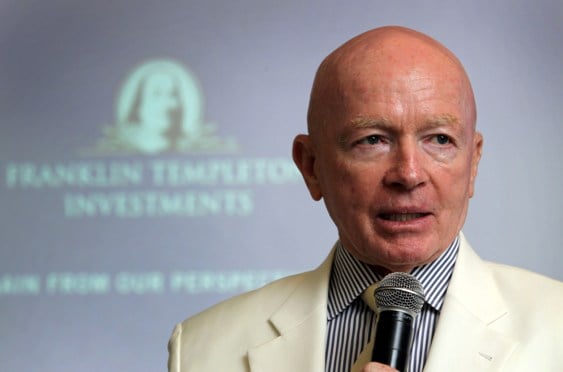Emerging market guru says inflation will force investors back into equities; 'bouncing along the bottom'
Global stock markets are “bouncing along the bottom” after tumbling 16 percent in the past four weeks, and will start to climb as inflation accelerates, said Templeton Asset Management's Mark Mobius.
The U.S. Federal Reserve hasn't given up supporting the economy by printing money and buying more Treasuries, said Mobius, executive chairman of Templeton Asset's emerging markets group. The firm is buying commodity stocks, expecting raw material prices to rise, he said.
“At this point, I do think we're bouncing along the bottom,” Mobius, who helps manage about $50 billion, said in a telephone interview with Bloomberg Television today. “For us in equities, it's particularly good because people will eventually realize that to beat inflation that's coming as a result of this higher money supply, we're going to have to be into equities.”
The MSCI World (MXWO) Index of stocks fell last week for a fourth straight week as investors took flight after a deadlock in the U.S. congress brought the government to the brink of default, reports showed the world's biggest economy is slowing, and concern grew that Europe's sovereign-debt crisis will spread. The losses triggered speculation Fed Chairman Ben S. Bernanke will this weekend signal a third-round of asset purchases to help sustain a recovery.
Energy and material stocks have been among the three worst performers in the past month in the 10 industry groups tracked by the MSCI Asia-Pacific Index, as a measure of primary metals traded in London and New-York-traded oil futures slumped.
‘An Opportunity'
“It's been an opportunity,” said Mobius. “With the amount of liquidity coming into the system, commodity prices have to be maintained at higher and higher levels. The trend is very, very clear, and that's up.”
Mobius told Bloomberg TV Aug. 5 that he doesn't expect the U.S. to experience a double-dip recession because of the likelihood of further economic stimulus.
The S&P 500 may stage a short-term rally because companies are cashed up and likely to buy back shares at a time when price-to-earnings ratios are low, said economist Andrew Smithers. Investors should sell shares once their holdings gain 10 percent because even after the recent rout, U.S. stocks are about 40 percent above fair value, the president of research company Smithers & Co. said in an e-mail on Aug. 18.
Standard & Poor's 500 Index companies have about $291 in cash and short-term investments per share, according to data compiled by Bloomberg. That's the highest since 1998, when Bloomberg data became available.
Volatility to Continue
Economists said reports this week may show U.S. companies ordered less equipment in July, and that the economy grew even less in the second quarter than previously estimated.
“It's not certain to us what the Federal Reserve can say to calm people's nerves,” Don Williams, chief investment officer at Platypus Asset Management Ltd. in Sydney, said in a separate Bloomberg Television interview today. “This period of volatility that we're in has still got a way to play out.”
Global stocks will rise even amid investor concern that Europe's sovereign debt crisis may be prolonged by German Chancellor Angela Merkel's resistance to calls for common euro- area bonds, according to Mobius.
The region's crisis is moving toward a resolution after European Union pledges this year to stabilize the euro-area economy and stave off a Greek default, Mobius said.
“I believe the situation in Europe will get better now that they have a facility to bail out these countries,” he said. “But in the meantime, the loss of confidence has really hit both sides of the Atlantic, and that's something that's going to have to wear away as we go forward.”
Mobius said today he remained interested in consumer stocks, as well as equities in emerging markets such as Brazil, China, Thailand, Indonesia and Russia. On Aug. 5, he told Bloomberg TV that emerging economies were in “better shape” than developed nations amid the turmoil roiling global markets.
--Bloomberg News--







